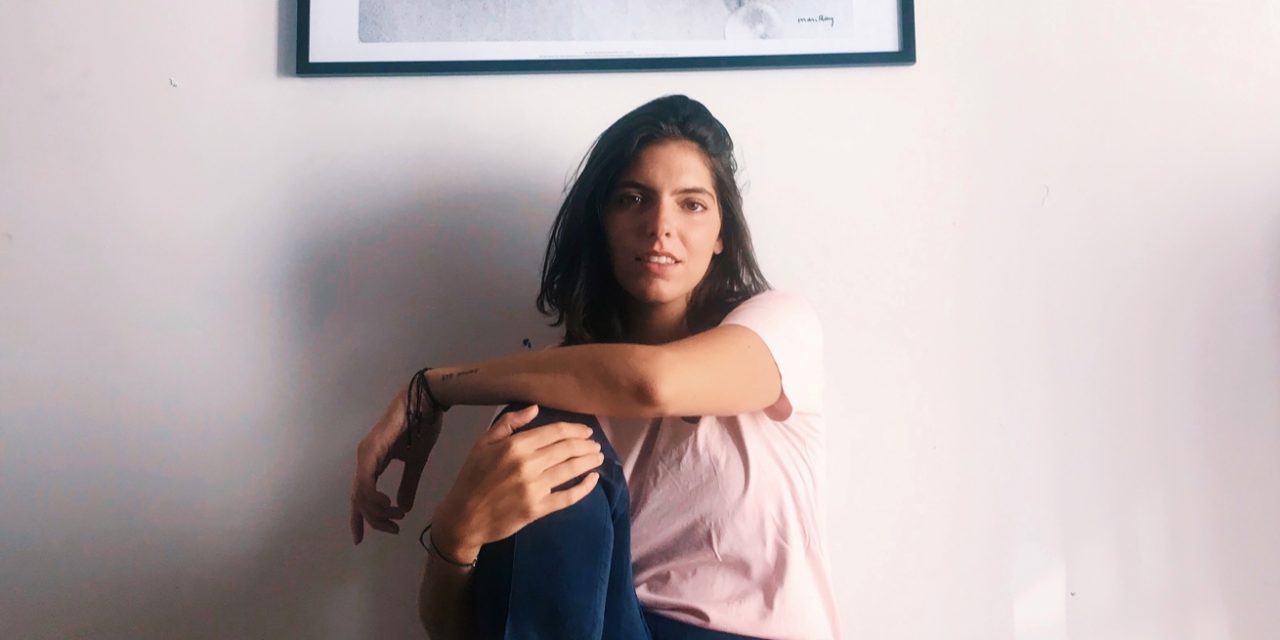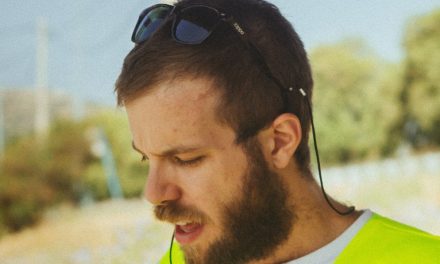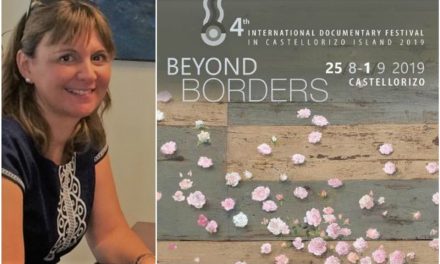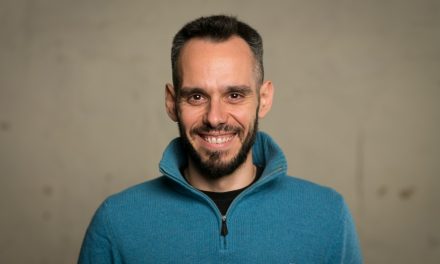There is no place for Sofia, the protagonist of “Hector Malot: The Last Day of the Year”, not even in the selfie taken with her friends in the last day of the year, a day that has to be spent in joy, in the company of dear ones. Jacqueline Lentzou, writer and director of the film, follows Sofia, as she wonders around Athens, trying to find those dear ones, proving that you don’t have to be homeless or marginalized to face the absurdity of loneliness. “Hector Malot: The Last Day of the Year” (2018) premiered in Cannes’ Semaine de la Critique and won the prestigious Leica Cine Discovery Award.
Writer and film director Jacqueline Lentzou was born in Athens, in 1989. Her work revolves around unconventional family constructs, coming-of-age, intimacy and the dream. Her cinematic language involves finding poetry in seemingly mundane premises. She is a London Film School graduate (Distinction, 2013), a Sarajevo (2014) and Berlinale (2015) Talents alumna. Her graduation project, “Thirteen Blue” (2013), screened in several international film festivals and won, among others, Best International Short in Athens Film & Video FF, was shortlisted for the Oscar nomination, as well as the Golden Egg Award in Reykjavik IFF.
Her semi-feature’s “Fox” (2016) script was selected at Berlinale Short Film Station. “Fox”, a coming of age film, had its world premiere in Locarno (2016), winning Best International Short from the Cinema & Gioventu Jury. Until now, FOX has won over 20 awards worldwide, including Best Short from PanHellenic Critics’ Association, Best European Short at Film Du Femme Creteil, and the upmost prestigious Award in the Memory of Ingmar Bergman.
“Hiwa” (2017)
“Hiwa” (2017), a short film on a Filipino man’s nightmare, containing all parental anxieties in condensed form, had its world premiere at Berlinale and was listed as one of the best shorts of the year in anOthermag.com, as well as in Cineuropa’s Official Website.
In 2017 Lentzou was invited by Vienna Shorts as an Artist in Spotlight, where a retrospective of her full body of work was held. In the same year, she was invited to represent Greece in the special edition of Locarno Filmmakers’ Academy. In Torino Film Lab “Selini66”, her debut feature project, won the award issued by the CNC to one of the 23 Script & Pitch participants.
Jacqueline Lentzou talks to Greek News Agenda* about “Hector Malot: The Last Day of the Year”, shot in the first week of 2018 with the money collected from Fox’s awards. She explains that she was instinctively driven to the notion of flaneur, the city wanderer and passionate observer, for Sofia, the central character of “Hector Malot”. Lentzou underlines that being an observer implies the heavy personal acceptance of the utopia of belonging. Asked about the different ways individuals deal with trauma and pain, she answers that, for her, the biggest issue is denial. What she finds most problematic and finally entertaining, in a cynical way, is the pretention of happiness. Lentzou further elaborates on her need to reflect on the momentary experience, the feeling, rather than on an objective depiction of the subject, which leads to her impressionistic approach.
Sofia Kokkali, “Hector Malot: The Last Day of the Year” (2018)
In “Hector Malot” you depict the absolute loneliness of the central character, Sofia, with subtle strokes of comedy, which deepen the tragic effect of what she is going through. Who is Sofia? Is it you, is she a contemporary flaneur and why is she so easy to identify with? In other words is it a) an autobiographical film, b) a woman’s story c) a commentary on the universality of loneliness or d) all of the above?
It is very interesting that you come up with the word ‘flaneur’, as during my work on the script it was written in my notebook, underlined and circled, both with pen and pencil. Until last year, I was oblivious to the term’s existence, a term that perfectly describes part of my way of being. After discovering this word, I came across Baudelaire’s ‘Painter of Life’ which served in a way as the ‘literature’ behind the film; a secret one.
So, to answer your question, Sofia is indeed a modern flaneur. Walking aimlessly, trying to entertain the passage of time, gradually becoming an observer of life. Being an observer is a lonely hobby. You are part of something, yet at the same time you are not. This is a very thin line, a tough existential game, as it implies a heavy personal acceptance: that of the utopia of belonging.
If, the film indeed is open for identification as your question implies, then I believe it has to do more with the depiction of the absurd, rather than the depiction of loneliness. I think it is too much of a bold move to accept one’s absolute loneliness, and this is why in the film many refrain from referring to it as its key thematic line, but they mention it as a mood element. On the contrary, it is much easier to talk about the absurd, it is easy to spot shades of it in everyday life, especially in Greece.
Regarding autobiographical elements, it is an undeniable fact that they exist in all of my works, however this is only part of the worlds I aim to create, not the core. Personal experience is, for me at least, the most pivotal tool in filmmaking. Along with intuition, they are the sole compass I have found and trust.
“Fox” (2016)
Separation in its various forms (divorce, death or migration of a parent) seems to be the source of misfortune for your films’ characters and it works as a leit motif in your films. There is a psychoanalytic background to the way you work on your characters and their dreams have a dominant role in your films. The role of family defines to a large extent your characters’ later life. How do you deal with the absurdity of pain and how do you think individuals cope with their traumatic experiences?
I do not believe in the absurdity of pain. I do not find pain absurd. I see it as a rather natural consequence of life. I see pain like water: that natural and that ample.
Thus, I deal with pain in a similar way to water.
So, how do you deal with water? There are not many options. You dive in it, you observe it, or you consume it. I try to dive in it, after observing it. I try to ‘steal’ its emotional depth and transform it into something else. I feel that pain can be fundamental material for the construction of something meaningful. And ever since I’ve known myself, I’ve been walking in this direction.
As far as how other individuals cope with their trauma, I do not have an easy answer. I think it’s dangerous to talk on behalf of humanity! At the same time I know that trauma equals darkness and we all know how difficult and sometimes impossible it can be to face it, let alone cope with it. My observations lead to the conclusion that the biggest issue is denial. People mostly deny their traumas, they are afraid to see them, let alone accept them and see that they are part of their present personalities.
Unfortunately, it is still a taboo, to admit that you have suffered or that you still suffer. It is not ‘cool’. It is ‘cool’ to pretend, in a way. Which is part of the pathology of our society: being functional, being happy and ready to seize the day.
This really entertains me – from a cynical point of view.
“Fox” (2016)
There are certain traits in your cinematic language: You place particular focus on the plot; you work with hand held cameras and long takes; how do you work with editing and plot in building your stories and how did you combine all the above mentioned traits to reach an impressionistic effect?
I place particular focus on the writing, rather than the editing. Apart from “Hiwa”, whose form was discovered in the editing suite, “Fox” and “Hector” were more straightforward. I love to write, and since I tend to write visually, in the short form, this has proven to be an advantage.
When I try to think why I prefer hand held cameras, why I prefer long takes, I find the answer in my primal contact with the medium of camera, which dates back to when I was 10. I did not know anything, I was just playing and if someone sees those tapes, there are huge similarities in the cinematic approach.
It is a fact that I am not up for high stylization, although I admire it when it’s being done well. I just don’t see the world so beautiful and symmetric. I see the world grainy, confusing and fragmented and that’s how I depict it in my films.
The word impressionistic is really spot-on. If someone examines the painting movement of impressionism, and how historically the shift took place, what need was satisfied and the reasons behind it, it really describes my cinema: the need to reflect on the momentary experience, the feeling, rather than an objective depiction of the subject.
Is there objectivity, of any kind?
Sofia Kokkali, “Hector Malot: The Last Day of the Year” (2018)
How difficult is it for a young talented filmmaker like you to work in Greece?
We all know the difficulties, since the socioeconomic situation reflects everywhere intensely and precisely.
Yes, there are delays. There is waiting. There are bureaucratic complications. There is anger and impatience.
At the very same time though, there are good intentions. There is risk taking. There is energy. There is vision. And so I make films, in Greece, in 2018, and instead of writing a long note of complaint, I prefer to emphasize on the light, because it exists. It is due to this light that Greek filmmakers, short and feature, succeed abroad.
Complaining about one’s country is in a way similar to complaining about one’s family. None is ever perfect, and due to these very imperfections we have various idiosyncracies, hues and textures, which as far as I’m concerned is the only real wealth.
What are your future plans?
The feature is the future!
HECTOR MALOT: THE LAST DAY OF THE YEAR [OFFICIAL TEASER 2018].
See also: Jacqueline Lentzou’s interview with Cannes’ Semaine de la Critique
* Interview by Florentia Kiortsi














